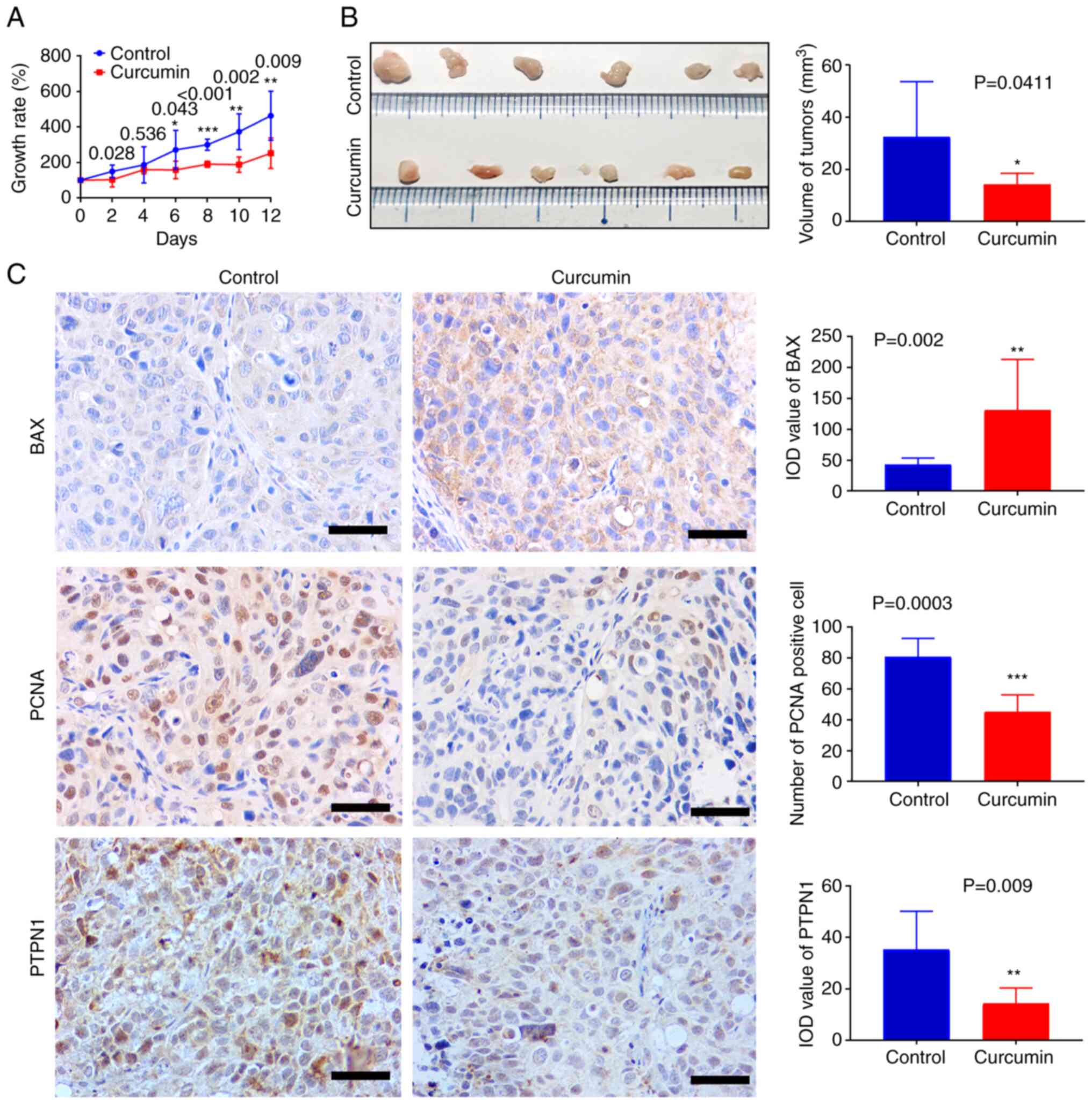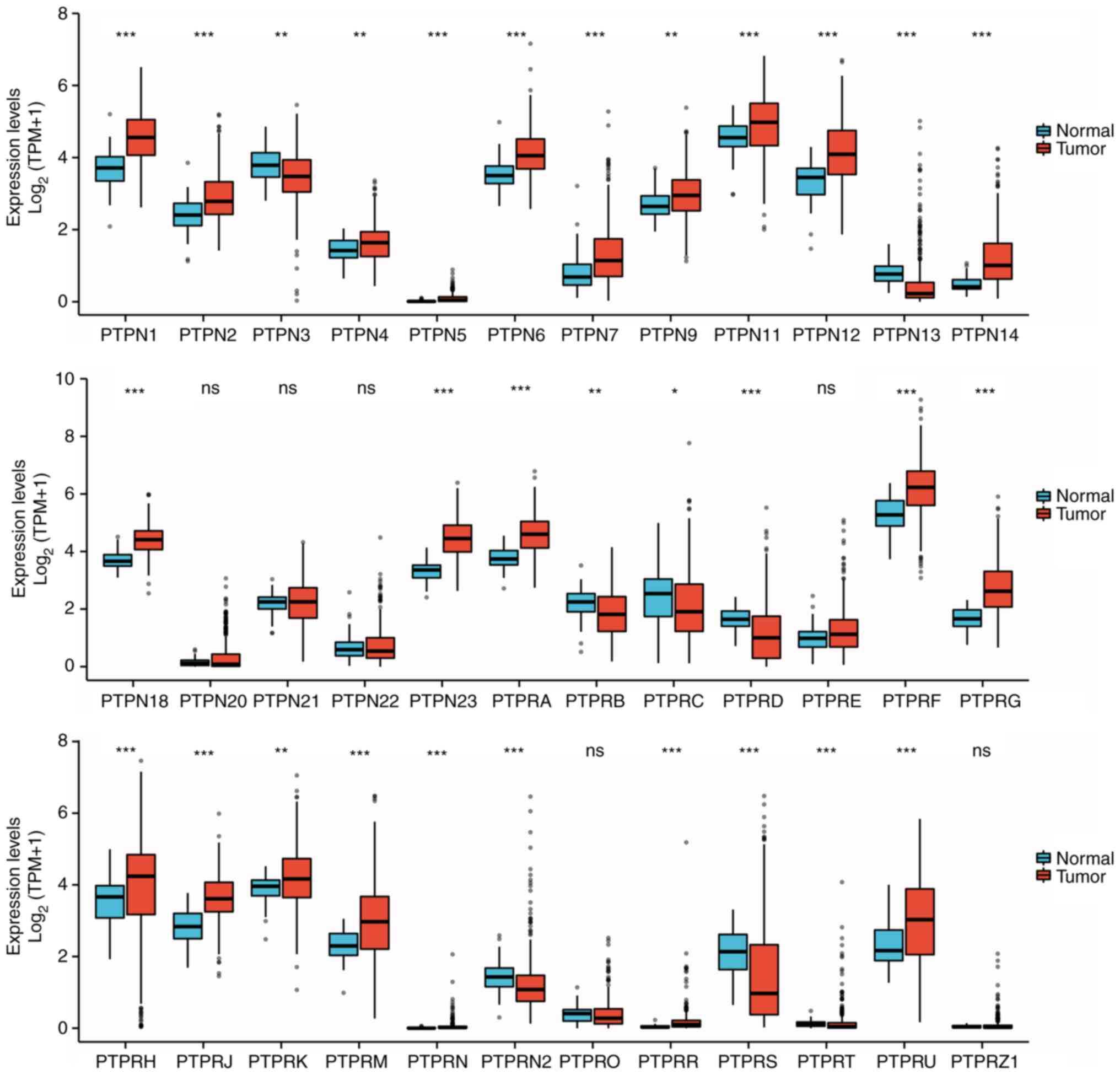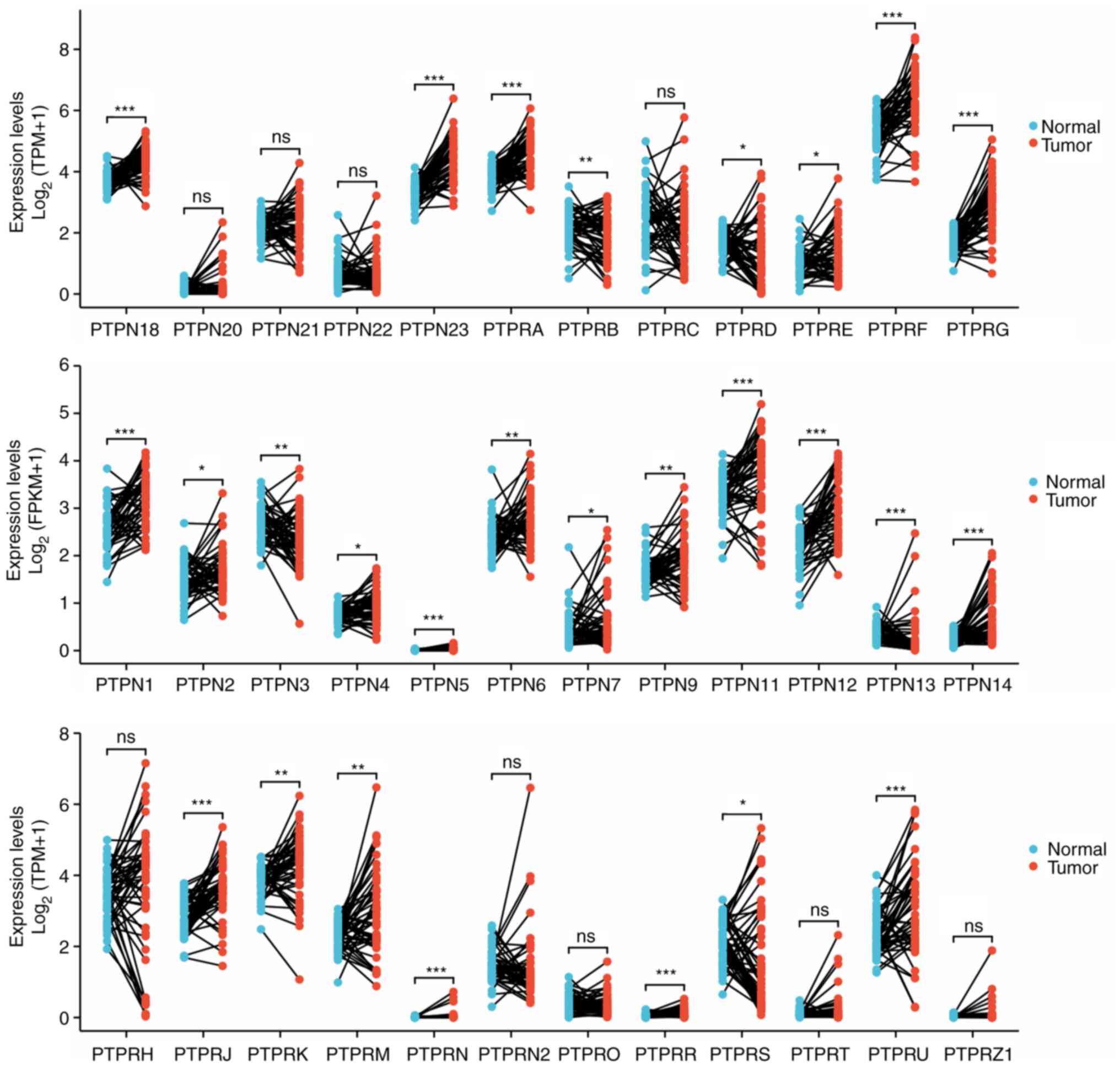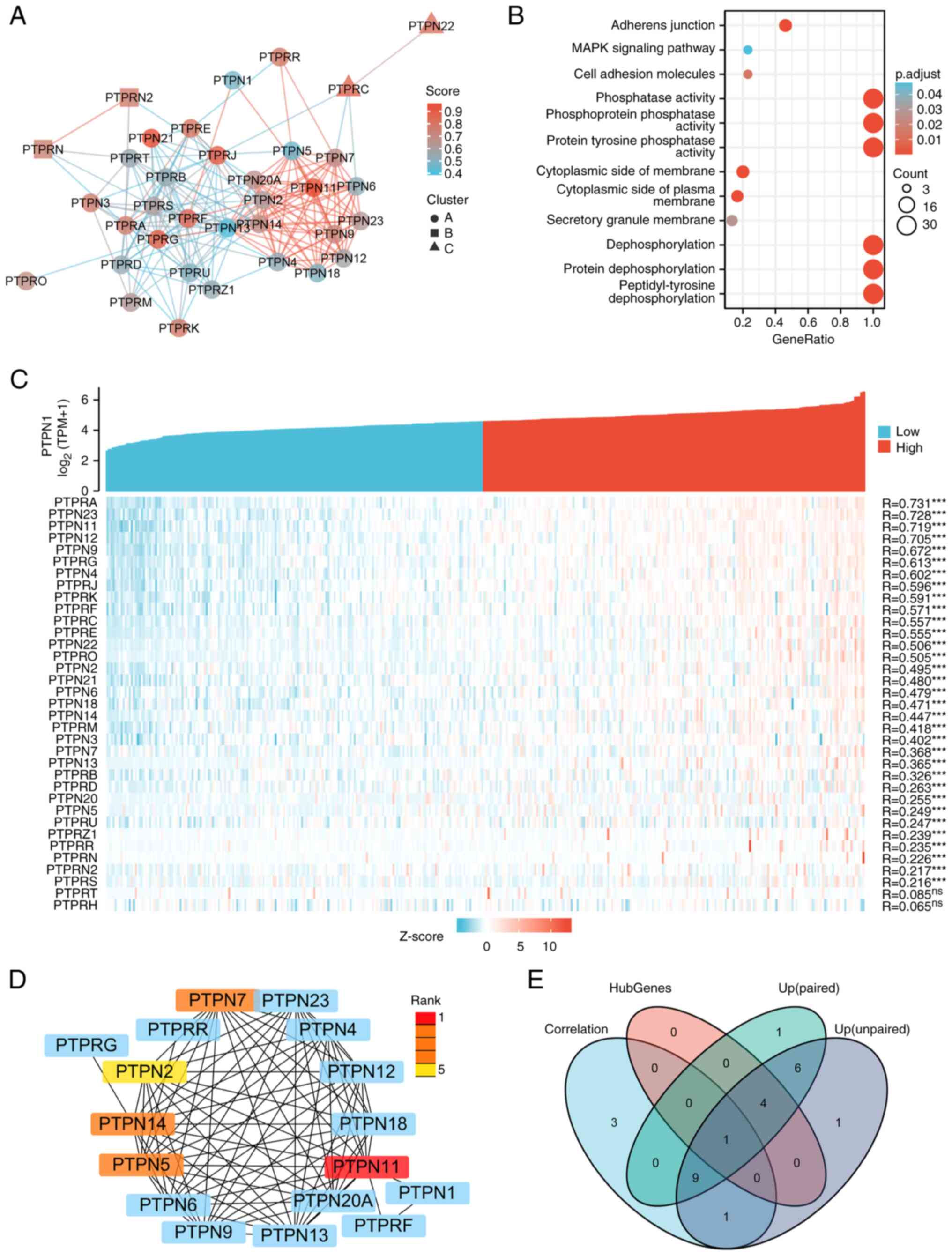|
1
|
Siegel RL, Miller KD, Fuchs HE and Jemal
A: Cancer statistics, 2021. CA Cancer J Clin. 71:7–33. 2021.
View Article : Google Scholar : PubMed/NCBI
|
|
2
|
Forner A, Reig M and Bruix J:
Hepatocellular carcinoma. Lancet. 391:1301–1314. 2018. View Article : Google Scholar : PubMed/NCBI
|
|
3
|
Luo XY, Wu KM and He XX: Advances in drug
development for hepatocellular carcinoma: Clinical trials and
potential therapeutic targets. J Exp Clin Cancer Res. 40:1722021.
View Article : Google Scholar : PubMed/NCBI
|
|
4
|
Zhang HH, Zhang Y, Cheng YN, Gong FL, Cao
ZQ, Yu LG and Guo XL: Metformin incombination with curcumin
inhibits the growth, metastasis, and angiogenesis of hepatocellular
carcinoma in vitro and in vivo. Mol Carcinog. 57:44–56. 2018.
View Article : Google Scholar : PubMed/NCBI
|
|
5
|
Baby J, Devan AR, Kumar AR, Gorantla JN,
Nair B, Aishwarya TS and Nath LR: Cogent role of flavonoids as key
orchestrators of chemoprevention of hepatocellular carcinoma: A
review. J Food Biochem. 45:e137612021. View Article : Google Scholar : PubMed/NCBI
|
|
6
|
Ghobadi N and Asoodeh A: Co-administration
of curcumin with other phytochemicals improves anticancer activity
by regulating multiple molecular targets. Phytother Res.
37:1688–1702. 2023. View
Article : Google Scholar : PubMed/NCBI
|
|
7
|
Khan H, Ni Z, Feng H, Xing Y, Wu X, Huang
D, Chen L, Niu Y and Shi G: Combination of curcumin with N-n-butyl
haloperidol iodide inhibits hepatocellular carcinoma malignant
proliferation by downregulating enhancer of zeste homolog 2
(EZH2)-lncRNA H19 to silence Wnt/β-catenin signaling.
Phytomedicine. 91:1537062021. View Article : Google Scholar : PubMed/NCBI
|
|
8
|
Bai C, Zhao J, Su J, Chen J, Cui X, Sun M
and Zhang X: Curcumin induces mitochondrial apoptosis in human
hepatoma cells through BCLAF1-mediated modulation of
PI3K/AKT/GSK-3β signaling. Life Sci. 306:1208042022. View Article : Google Scholar : PubMed/NCBI
|
|
9
|
Khan H, Ullah H and Nabavi SM: Mechanistic
insights of hepatoprotective effects of curcumin: Therapeutic
updates and future prospects. Food Chem Toxicol. 124:182–191. 2019.
View Article : Google Scholar : PubMed/NCBI
|
|
10
|
Xu J, Lin H, Wu G, Zhu M and Li M:
IL-6/STAT3 is a promising therapeutic target for hepatocellular
carcinoma. Front Oncol. 11:7609712021. View Article : Google Scholar : PubMed/NCBI
|
|
11
|
Shao S, Duan W, Xu Q, Li X, Han L, Li W,
Zhang D, Wang Z and Lei J: Curcumin suppresses hepatic stellate
cell-induced hepatocarcinoma angiogenesis and invasion through
downregulating CTGF. Oxid Med Cell Longev. 2019:81485102019.
View Article : Google Scholar : PubMed/NCBI
|
|
12
|
Liu J, Lichtenberg T, Hoadley KA, Poisson
LM, Lazar AJ, Cherniack AD, Kovatich AJ, Benz CC, Levine DA, Lee
AV, et al: An integrated TCGA pan-cancer clinical data resource to
drive high-quality survival outcome analytics. Cell.
173:400–416.e11. 2018. View Article : Google Scholar : PubMed/NCBI
|
|
13
|
Yu G, Wang LG, Han Y and He QY:
clusterProfiler: An R package for comparing biological themes among
gene clusters. OMICS. 16:284–287. 2012. View Article : Google Scholar : PubMed/NCBI
|
|
14
|
Sreepriya M and Bali G: Chemopreventive
effects of embelin and curcumin against
N-nitrosodiethylamine/phenobarbital-induced hepatocarcinogenesis in
Wistar rats. Fitoterapia. 76:549–555. 2005. View Article : Google Scholar : PubMed/NCBI
|
|
15
|
Karaboga Arslan A, Uzunhisarcıklı E, Yerer
M and Bishayee A: The golden spice curcumin in cancer: A
perspective on finalized clinical trials during the last 10 years.
J Cancer Res Ther. 18:19–26. 2022. View Article : Google Scholar : PubMed/NCBI
|
|
16
|
Wang L, Zhu Z, Han L, Zhao L, Weng J, Yang
H, Wu S, Chen K, Wu L and Chen T: A curcumin derivative, WZ35,
suppresses hepatocellular cancer cell growth via downregulating
YAP-mediated autophagy. Food Funct. 10:3748–3757. 2019. View Article : Google Scholar : PubMed/NCBI
|
|
17
|
Giordano A and Tommonaro G: Curcumin and
cancer. Nutrients. 11:23762019. View Article : Google Scholar : PubMed/NCBI
|
|
18
|
Elkhamesy A, Refaat M, Gouida MSO, Alrdahe
SS and Youssef MM: Diminished CCl4-induced
hepatocellular carcinoma, oxidative stress, and apoptosis by
co-administration of curcumin or selenium in mice. J Food Biochem.
46:e138452022. View Article : Google Scholar : PubMed/NCBI
|
|
19
|
Salehi B, Stojanović-Radić Z, Matejić J,
Sharifi-Rad M, Anil Kumar NV, Martins N and Sharifi-Rad J: The
therapeutic potential of curcumin: A review of clinical trials. Eur
J Med Chem. 163:527–545. 2019. View Article : Google Scholar : PubMed/NCBI
|
|
20
|
Tonks NK, Diltz CD and Fischer EH:
Purification of the major protein-tyrosine-phosphatases of human
placenta. J Biol Chem. 263:6722–6730. 1988. View Article : Google Scholar : PubMed/NCBI
|
|
21
|
Chen PJ and Zhang YT: Protein tyrosine
phosphatase 1B (PTP1B): Insights into its new implications in
tumorigenesis. Curr Cancer Drug Targets. 22:181–194. 2022.
View Article : Google Scholar : PubMed/NCBI
|
|
22
|
Sivaganesh V, Sivaganesh V, Scanlon C,
Iskander A, Maher S, Lê T and Peethambaran B: Protein tyrosine
phosphatases: Mechanisms in cancer. Int J Mol Sci. 22:128652021.
View Article : Google Scholar : PubMed/NCBI
|
|
23
|
Teimouri M, Hosseini H, ArabSadeghabadi Z,
Babaei-Khorzoughi R, Gorgani-Firuzjaee S and Meshkani R: The role
of protein tyrosine phosphatase 1B (PTP1B) in the pathogenesis of
type 2 diabetes mellitus and its complications. J Physiol Biochem.
78:307–322. 2022. View Article : Google Scholar : PubMed/NCBI
|
|
24
|
Maheshwari N, Karthikeyan C, Trivedi P and
Moorthy NSHN: Recent advances in protein tyrosine phosphatase 1B
targeted drug discovery for type II diabetes and obesity. Curr Drug
Targets. 19:551–575. 2018. View Article : Google Scholar : PubMed/NCBI
|
|
25
|
Kostrzewa T, Przychodzen P,
Gorska-Ponikowska M and Kuban-Jankowska A: Curcumin and
Cinnamaldehyde as PTP1B inhibitors with antidiabetic and anticancer
potential. Anticancer Res. 39:745–749. 2019. View Article : Google Scholar : PubMed/NCBI
|
|
26
|
Kostrzewa T, Wołosewicz K, Jamrozik M,
Drzeżdżon J, Siemińska J, Jacewicz D, Górska-Ponikowska M,
Kołaczkowski M, Łaźny R and Kuban-Jankowska A: Curcumin and its new
derivatives: Correlation between cytotoxicity against breast cancer
cell lines, degradation of PTP1B phosphatase and ROS generation.
Int J Mol Sci. 22:103682021. View Article : Google Scholar : PubMed/NCBI
|
|
27
|
Radhakrishnan VM, Kojs P, Young G,
Ramalingam R, Jagadish B, Mash EA, Martinez JD, Ghishan FK and
Kiela PR: pTyr421 cortactin is overexpressed in colon cancer and is
dephosphorylated by curcumin: Involvement of non-receptor type 1
protein tyrosine phosphatase (PTPN1). PLoS One. 9:e857962014.
View Article : Google Scholar : PubMed/NCBI
|
|
28
|
Chen C, Cao M, Zhu S, Wang C, Liang F, Yan
L and Luo D: Discovery of a novel inhibitor of the protein tyrosine
phosphatase Shp2. Sci Rep. 5:176262015. View Article : Google Scholar : PubMed/NCBI
|
|
29
|
Asmamaw MD, Shi XJ, Zhang LR and Liu HM: A
comprehensive review of SHP2 and its role in cancer. Cell Oncol
(Dordr). 45:729–753. 2022. View Article : Google Scholar : PubMed/NCBI
|
|
30
|
Liu JJ, Li Y, Chen WS, Liang Y, Wang G,
Zong M, Kaneko K, Xu R, Karin M and Feng GS: Shp2 deletion in
hepatocytes suppresses hepatocarcinogenesis driven by oncogenic
β-catenin, PIK3CA and MET. J Hepatol. 69:79–88. 2018. View Article : Google Scholar : PubMed/NCBI
|
|
31
|
Han T, Xiang DM, Sun W, Liu N, Sun HL, Wen
W, Shen WF, Wang RY, Chen C, Wang X, et al: PTPN11/Shp2
overexpression enhances liver cancer progression and predicts poor
prognosis of patients. J Hepatol. 63:651–660. 2015. View Article : Google Scholar : PubMed/NCBI
|
|
32
|
Yue X, Han T, Hao W, Wang M and Fu Y: SHP2
knockdown ameliorates liver insulin resistance by activating IRS-2
phosphorylation through the AKT and ERK1/2 signaling pathways. FEBS
Open Bio. 10:2578–2587. 2020. View Article : Google Scholar : PubMed/NCBI
|
|
33
|
Xiang D, Cheng Z, Liu H, Wang X, Han T,
Sun W, Li X, Yang W, Chen C, Xia M, et al: Shp2 promotes liver
cancer stem cell expansion by augmenting β-catenin signaling and
predicts chemotherapeutic response of patients. Hepatology.
65:1566–1580. 2017. View Article : Google Scholar : PubMed/NCBI
|



















